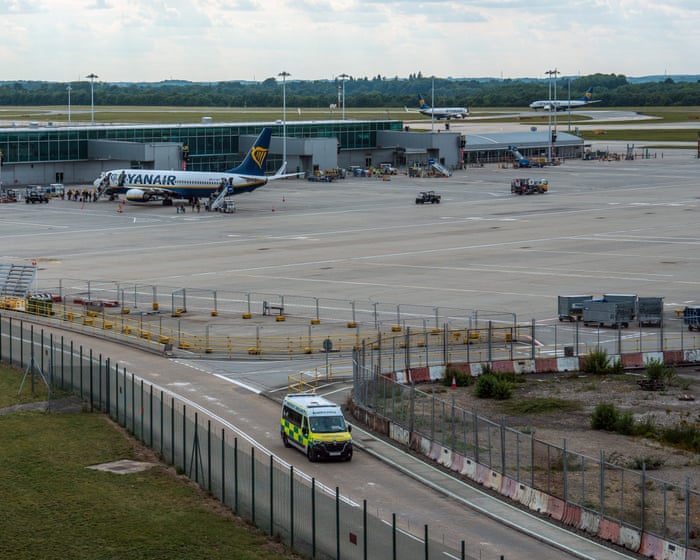Donald Trump has called Vladimir Putin’s announcement of a nuclear-powered cruise missile test “not appropriate” as tensions rise between Moscow and Washington.
On Sunday, Putin announced that Russia had successfully tested its “unique” nuclear-capable Burevestnik cruise missile, which the Kremlin said was part of efforts to “ensure the country’s national security.”
When reporters asked Trump about the test on Monday while he was aboard Air Force One, he replied that Putin should focus on ending the war in Ukraine instead of testing missiles. Trump noted that the U.S. has a nuclear submarine “right off their shores” that doesn’t need to travel long distances, adding, “We test missiles all the time.”
A day earlier, Putin, dressed in military fatigues during a meeting with top Russian generals, praised the missile as a breakthrough. “It is truly a unique weapon, one that no other country in the world possesses,” he said, ordering preparations to build the necessary infrastructure to put the system into military service.
Russia’s chief of the general staff, Valery Gerasimov, informed Putin that the test occurred on Tuesday, with the missile flying about 8,700 miles over 15 hours.
Sergei Ryabkov, a close aide to Putin, told Russian media that Moscow had given the U.S. advance notice of the planned missile test.
Putin first revealed the “invincible” Burevestnik in 2018, claiming it had an almost unlimited range and could evade U.S. missile defenses. “No one wanted to listen to us. So listen now,” he said at the time.
The system gained attention in 2019 after a failed test in the Arctic caused an explosion that killed at least five scientists.
Despite Putin’s boasts, experts have questioned the missile’s supposed invincibility. Jeffrey Lewis, a nuclear nonproliferation expert at the Middlebury Institute in California, wrote on X that “Nato aircraft could intercept it,” adding that the Burevestnik represents another step in an arms race with no winner for either side.
Despite repeated statements from both Moscow and Washington about wanting to halt the arms race, little progress has been made. The Kremlin recently criticized Trump’s push to develop a missile shield called the Golden Dome, which he claims would make the U.S. impervious to attack.
Last November, Moscow lowered the threshold for using nuclear weapons, a move widely seen as signaling its readiness to respond aggressively to perceived threats. Soon after, Russia deployed its new nuclear-capable Oreshnik missile in Ukraine.
The timing of Russia’s Burevestnik test is significant, coming amid the Kremlin’s increased nuclear posturing and a pause in U.S.-Russia talks over the war in Ukraine. Last week, Putin oversaw drills of Russia’s strategic nuclear forces.The military exercises involved practice missile launches. He also warned of a “very serious, if not crushing, response” if Ukraine uses Western-supplied missiles to strike deeper into Russian territory.
The Burevestnik nuclear-powered cruise missile was first revealed in 2018, when images of its assembly line were made public.
On Sunday, Russian state television explicitly described the drills as a warning to the West. Sergei Karaganov, a hardline and influential foreign policy expert, stated during a talk show that the exercise was essentially “a rehearsal for a first strike, meant as punishment or a warning if further aggression is taken against Russia.”
Tensions between Putin and Trump escalated after the U.S. government unexpectedly imposed sanctions last Wednesday on two of Russia’s biggest oil companies and approximately three dozen of their subsidiaries. These measures could significantly damage Moscow’s crucial energy earnings.
Further frustration with Washington was clear in an interview over the weekend with Russia’s long-serving foreign minister, Sergei Lavrov. He claimed the Trump administration’s stance on the war in Ukraine had “radically changed.”
In the interview with a Hungarian journalist, Lavrov criticized Trump’s proposal for Russia and Ukraine to freeze the frontlines and agree to a ceasefire—an idea that Moscow has dismissed.
Frequently Asked Questions
Of course Here is a list of FAQs about Trumps comments on Russias cruise missile test designed with clear questions and direct answers
Basic Understanding Context
1 What exactly did Trump say about Russias missile test
He called the test a violation of a key arms control treaty and stated that the United States would not let them go on and break an agreement and do weapons and were not allowed to
2 Which treaty was Russia accused of violating
The IntermediateRange Nuclear Forces Treaty It was a 1987 agreement between the US and Soviet Union that banned all landbased cruise and ballistic missiles with ranges between 500 and 5500 kilometers
3 Why is this missile test such a big deal
Its a big deal because it signifies the collapse of a major Cold Warera arms control agreement This could lead to a new arms race with the US and Russia developing and deploying new missiles that were previously banned increasing global tensions
4 What is a cruise missile
A cruise missile is a guided missile that can travel long distances at low altitudes often flying like an unmanned airplane They can be launched from land sea or air and are designed to hit specific targets with high precision
Deeper Analysis Implications
5 Why did Russia develop this missile if it broke the treaty
The US and its allies believe Russia developed the missile to gain a military advantage particularly by being able to threaten key European allies with a weapon that is difficult to detect and has a short flight time
6 How did the US and its allies respond to the test
The primary response was the US officially suspending its obligations under the INF Treaty in February 2019 starting a sixmonth withdrawal process that ultimately led to the treatys demise NATO allies publicly supported the US position and condemned Russias actions
7 What are the practical consequences of the INF Treaty ending
The end of the treaty means both the US and Russia are now free to develop and deploy the types of intermediaterange missiles that were banned This could lead to new missile deployments in Europe and Asia altering the strategic balance and potentially making those regions less stable



